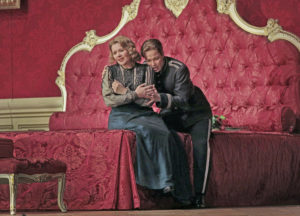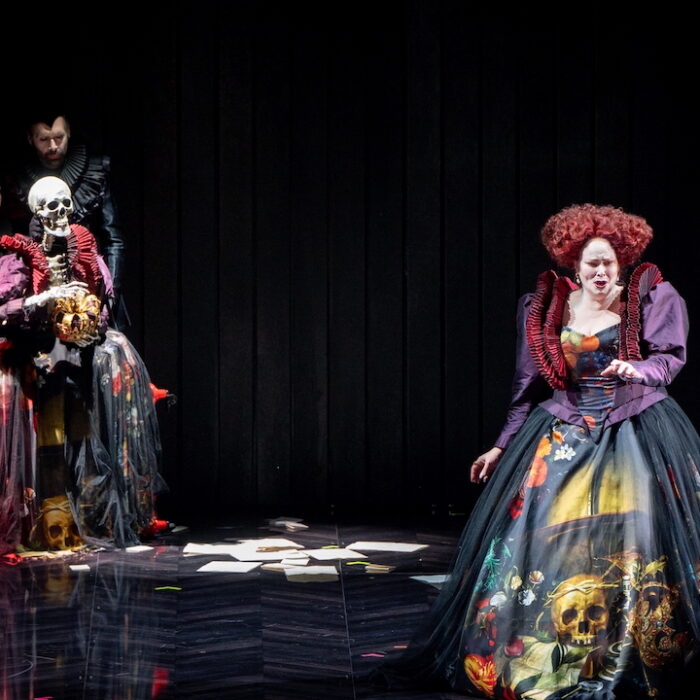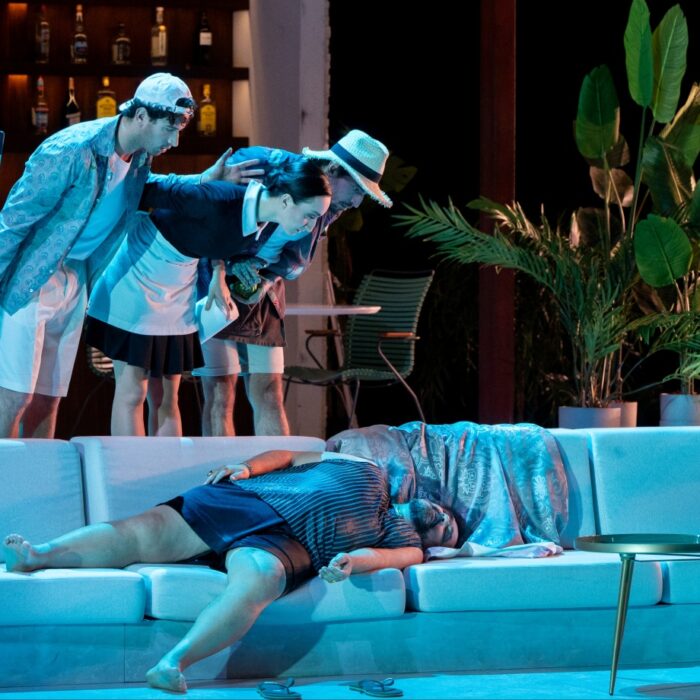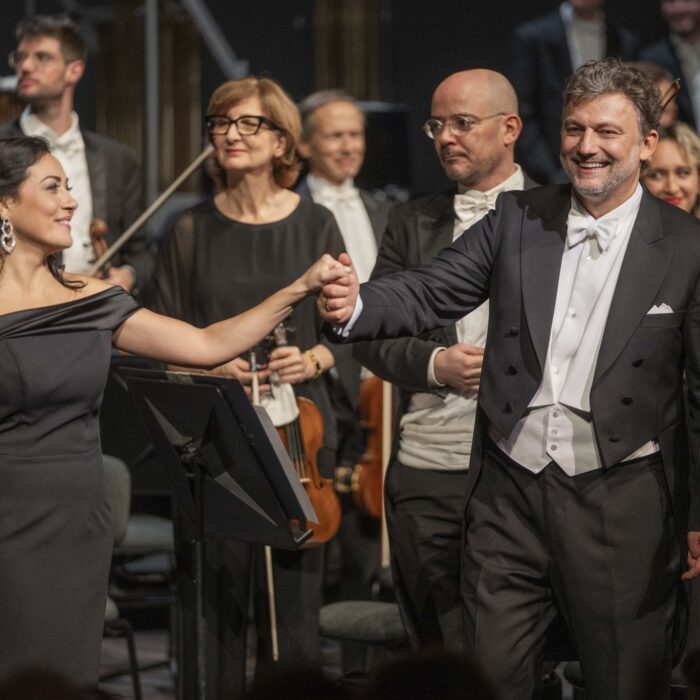
Metropolitan Opera 2016-17 Review – Der Rosenkavalier: Elīna Garanča, Günther Groissböck Deliver Nuanced Performances In Solid Production
By David SalazarThe Metropolitan Opera’s new production of “Der Rosenkavalier” by Robert Carsen is as high stakes as it gets these days for the company in both the short and long-term view.
In the short-term view, this production is the punctuation on the current season, its final new staging. It will also be the final HD performance of the season, and more importantly, it has become a major event largely because it signals the swansong for Renée Fleming’s CURRENT opera career (to clarify one last time – she is not retiring from opera).
In the larger view, general manager Peter Gelb has to deliver a solid production that will likely carry Strauss’ most popular opera (it has been performed over 400 times at the Met) for years to come to be a worthy investment. It’s early reception at the start of the run, boos throughout the auditorium hurled at Carsen and his production team, does not bode well.
In my view, the reaction, while a bit hostile, is not completely unwarranted.
One Fatal Flaw
Let’s get the one negative out of the way first so we can explore what makes this arguably the best new production of the 2016-17 season.
The final scene’s setting is a huge problem in that it justifies people’s fear that directors put their visions above the composer’s and librettist’s own. It justifies the fears that modern opera is more about effect than consistent character and story development.
Acts 1 and 2 are clearly established as the domains of men. When the red curtain rises, we see the hallway of the Marschallin’s palace, a central door leading us into her room. But right away, we are greeted by two large paintings of men in military get-up. The opera has been set on the eve of World War I, male domination the seeming cause. When we finally enter the Marschallin’s bedroom the walls are filled with more portraits and paintings of men, some on the battlefield. Even though we are in the private quarters of the most powerful woman in the land, Carsen reminds us that she remains subordinate to men.
The second act takes us to Faninal’s home where men continue to dominate the world. Two large cannons represent the first images we see, along with war images on the wall, and throughout this act an entire legion of soldiers will accompany Baron Ochs, the militaristic world clenching its fist on all those around them.
In the third act, female exploitation reaches its nadir, Carsen transferring the opera to a brothel. Here portraits of naked women replace the portraits of men and a dozen prostitutes engage in orgies. It works to a certain extent, emphasizing the objectification of women for men’s pleasure.
But Carsen puts himself into a rather sticky situation by choosing this locale and ultimately sacrifices story logic for effect. When children run on the set as part of the massive scheme, suspense of disbelief gets strained. But then it gets annihilated the moment the Marschallin herself walks into this place. We can accept certain concepts, but can anyone really believe that a person of royalty will really show herself in this kind of establishment in 1911? Strauss and von Hofmannsthal’s libretto already asks a lot of the viewer when the Marschallin walks into a tavern in the original libretto, but the brothel really strains the credibility. Carsen gives himself a moment to rectify the error when he brings back the brothel entrance, suggesting a potential scene transition behind the central door, but alas, it never comes and we are stuck watching the glorious final scene unfold in a location that would be inappropriate for at least two of the three characters. And then would people believe that Faninal, who just got sick after seeing Baron Ochs’ questionable morals be okay with seeing his daughter, whose honor he just defended, ready to make love in a brothel for all to see? Call it nitpicking, but great directing is about creating consistent and credible characters. That isn’t the case at the opera’s close.
Also worthy of note is that the gargantuan sets seemed to swallow the singers’ voices rather easily, especially when the orchestra made any crescendo.
The Merits
On the flipside, great characters are what actually carries this production and the greatest idea that Carsen has is that too much testosterone in power will prove destructive. As Sophie and Octavian fall into each other’s arms on a bed in the brothel to consummate their love, the stage opens up and we are greeted with two warring factions falling limply to the ground. War has either started or ended with disastrous results.
War breaking out has been hinted at from the get-go in the form of Ochs. In most productions, he is just a farce of a chivalrous knight, but we never sense him to be much of a threat. In this production, he comes off as a competent villain that needs to be dealt with. Throughout he is portrayed as a brusque man who spends his time on stage making lewd advances on women and bullying other men into doing what he wants. Throughout the second act, he carries his men around with him as a shield and providing truly threatening obstacles for the opera’s heroes. They say that a good story is only as good as its villain, and Carsen’s decision to delve deeper into Ochs raises this production to another level.
The seduction in Act 3 also undergoes a transformation from the original source. Instead of Ochs taking the initiative to seduce Mariandel, it is “Mariandel” who makes intense overtures toward him. The choice opens up some odd questions about Octavian intense seduction while playing with the audience’s already confused reading of the female disguise of a male character played by a woman. When Ochs makes the advances, the audience sees Octavian’s rejections as a sign of his inherent disgust. But when Mariandel is the one making the advances and you know its Octavian grabbing Ochs all over, and seemingly having fun, you have to wonder what Carsen might be suggesting.
Also, worthy of note is the visual grammar employed throughout by Carsen and his production team. The first and final act are mirror images of one another, both starting with entrances to other rooms that are shaped identically and adorned with a bright red wallpaper. The middle act, the only place not governed by a woman is a drab black and white, suggesting men’s overall lack of imagination.
The lighting during the presentation of the rose is blue in its hue and a subsequent scene between Sophie and Octavian takes on a similar palette, giving their romance a mysterious and mystical feel. We leave the opera wondering about the two lovers’ future, not necessarily convinced that they will live on forever. This feeling is forged by the cool aura that this choice of lighting presents.
Overall, Carsen’s vision is coherent and insightful, with that one major point I made earlier.
A Diva Bids Adieu, For Now
Renée Fleming has been the major headliner of this production in a role she has been identified with at the Met for many years. On Friday, it was clear that the ability to project into the 4,000-seat auditorium no longer is what it once was. Yet she did stir in the final scene of Act 1 as she reflected on her age and the prospect of losing Octavian. Fleming’s overall arc throughout this scene was a gradual diminuendo pulling the listener in deeper and deeper into her own space. For those brief moments, you almost forgot about everything else on stage and were transported elsewhere. The moment was surreal, providing the night with a potent emotional core.
Her overall interpretation of the character was to depict the Marschallin as the only adult in a house full of children, always poised, stern and firm. Perhaps you might have expected a greater vulnerability in private scenes with Octavian, especially the end of Act 1, but Fleming ensured that this Marschallin never showed a single glimpse of true weakness. She certainly expressed in her voice, but physically, she was pure class and looked elegant walking onto the stage in a black fur coat to kick off the final sequence of the opera.
From Boy to Man to Woman & Back Again
Elīna Garanča is one of the great superstars in the opera world, her technical prowess and superlative dramatic abilities are among the finest there are right now. She reminded everyone of this very fact with arguably the most exhilarating performance of the night. From her walk to every single mannerism she made, you really believed she was an insatiable young boy. Throughout the scene with the Marschallin she egged her on sexually constantly looking for any moment he could find to put her back in bed. It made for some fun interplay between the two characters, Fleming showing restrained resistance, while Garanča faceplanting whenever she rejected his advances.
When she was tasked with becoming Mariandel, the Latvian mezzo showcased the awkwardness of a boy playing a woman to perfection. She could barely walk straight with heels on. She exaggerated her hip movements and facial expressions. When Baron Ochs made his moves, she would exaggerate her high-pitched screams.
When Octavian appears in the second act to deliver the rose, Garanča displayed his public self with authority, the sexually excited boy from Act 1 giving way to a poised and elegant man. He was gentle with Sophie throughout their exchange in the act and was inversely forceful and aggressive in his confrontations with Ochs.
The third act saw a switch back to Mariandel and here Garanča slowly allowed Octavian to grow comfortable as Octavian, the woman allowed to be set free in her seduction. And seduce she did, pulling out all the stops you could possibly imagine throughout the scene. Giving her the initiative made the tension rise as you momentarily forgot that this was a male character disguised as a woman.
Vocally, Garanča was just as flexible in her portrayal, her voluminous sound quite subdued in the early intimate scenes. Her legato was elegant, her timbre was darker and while her diction was clear, she didn’t punctuate consonants as much as she did when she transformed into Mariandel. As her feminine alter-ego, she added a nasal quality to her sound that had a brighter color.
We heard a more potent and brilliant vocal quality throughout the second act as Garanča portrayed the mature public figure of Octavian. The voice carried over everything and everyone and the quality was weightier as well. But during the love duet with Kathleen Kim’s Sophie, we heard the same vocal colors that the mezzo brought to her first duet with Fleming’s Marschallin reminding of Octavian the lover. On a subtle note, this choice also suggested that Octavian treated this relationship the same way he treated the Marschallin’s. We know how that turned out.
Throughout the glorious trio, the mezzo-soprano’s voice was the one to seize the day, rising over the two sopranos to ride the massive tonal wave. It cemented Octavian as the character in most conflict during this incredible passage of music. It also reminded every one of Garanča’s undeniable genius.
A Consummate Jerk
Another undeniable genius on the night was Günther Groissböck. I’ve done my share of complaining about the Met’s inability to give this incredible talent work of substance. I have no problems hearing him as luxury casting in minor roles in “Otello” or “Fidelio,” but the bottom line is that he should be headlining productions, not showing up for five minutes and calling it a day.
Thankfully, the Met gave him this production and he took the ball and ran with it.
As noted above, Carsen places a premium on making Ochs a compelling antagonist, but there is no way he convincingly pulls it off without Groissböck doing the heavy lifting. Elegant in stature and with an imposing figure, the bass’ Ochs initially comes off as a man of confidence and power. What he slowly revealed to us, is that Ochs is anything but this, turning into a pathetic jerk.
But those first moments are so crucial, Groissböck strutting about the stage like he owned the place, his voice booming with crisp volume. He grabbed Mariandel as he pleased, whether it be sitting her on his lap or putting his hands all over her body. And whenever she resisted, he sang with greater intensity, as if looking to overpower her vocally. During the Italian tenor’s second reprise of the aria, most stagings have the Marschallin interrupt the moment. But this one has the annoyed Ochs throw down a chair. Nothing annoys an opera lover more than having beautiful singing interrupted. If we didn’t already hate him, Carsen and Groissböck’s choice here certainly cemented that feeling at that moment.
We only grew to hate him more as the night progressed. Having his men hanging around him throughout the second act, there were moments where he looked ready to rape poor Sophie if not for interventions from Octavian. His bullying ways with Octavian no doubt made matters all the more angering.
Vocally, Groissböck’s meaty timbre seemed to become more and more delicate, with intermittent interjections of massive sound to fight back. It suggested the character’s fall from his lofty sense of power at the start. His second act monologue, sung over the famous waltz, had a leggiero quality, hinting at a rather delicate man. But then his coarser interjections threw the façade aside, reasserting the man’s brutish nature. When he was flanked by his men, he had no problems barking out orders and making threats with forceful volume. But when he was all alone in the brothel at the mercy of Mariandel, Groissböck’s vocal strategy employed a weaker timbre.
As he made his final threat to the Marschallin, his vocal colors took on a brighter tone that he peppered with sarcastic phrasing, but here too he was shut down by the firmer sounding Fleming.
Groissböck immersed the listener in his characterization while delineating the villainous Ochs with a character arc that many interpreters fail to do convincingly. We all enjoy making fun of Ochs for his poor manners and selfish behavior. But we all love to learn to hate him and then see him slowly fall apart.
A Nimble Damsel in Distress
Sophie is often showcased as a Damsel-in-Distress. She is the object of the villain’s affections, falls in love with the hero and must ultimately be saved by him. And Carsen ultimately doesn’t rectify this all that much.
But Kathleen Kim, who only gets two performances in this run, managed to give the character spunk and a bit of bite. This was most noticeable during her scenes with Ochs as she fought back against his violent advances. Her voice took on a pointed and jagged quality that contrasted greatly with the sweet singing she exhibited in her romance with Octavian.
She also played up Sophie’s flirtatious aspects, winking at Octavian and even leaning in as she recited all of his names. At a few moments, in one of the fun jokes of the night, she repeatedly got up from her seat as if to lead Octavian somewhere else, only to be repeatedly thwarted by one of her servants.
Best of the Rest
This opera’s cast is massive and the Met’s program required two pages to lay out every single soloist in the opera.
Standouts were Markus Brück as Faninal with a firm and resonant sound, his characterization showcasing the man as proud and firm. The duo of Helene Scneiderman and Alan Oke as Annina and Valzacchi were lecherous and snake-like in their movements, their voices quiet but threatening.
Of course, Matthew Polenzani cannot be ignored as the Italian tenor and his portrayal is an example of what Carsen does so well with his characters. Instead of being a generic singer, Polenzani’s was a true leading divo of his day, entering as if he were the most important man in the room. He handed the Marschallin a record and then went on to sing his famous aria, his voice blossoming with the lush bright colors that the American tenor possesses. No line was too high or challenging for Polenzani, his vibrato growing in intensity as Strauss’ riveting score climaxed. Audiences erupted with applause after the first recitation. The tenor then went over to flirt with some ladies, his decision to sing once more driven by his desire for a conquest. Here he sang with even more passion from the off, hinting at the character’s truer intentions. Of course, when he was cut off, he walked off stage, throwing a tantrum on his way out.
The Maestro
One final note must be given to maestro Sebastian Weigle whose surging tempi kept the night moving constantly. The delivery of the rose in Act 2 was undeniably the highlight of the night for me, the orchestral rising to the stirring and explosive climax before fading into the hushed leitmotif. It added to the suspense of the moment as Sophie and Octavian glance at one another, the gentle orchestral colors ebbing and flowing gracefully. The final trio was cathartic as Weigle showed no restraint in using his musical forces for powerful effect.
The production still has quite a few performances remaining and it is arguably the must-see opera on the Metropolitan Opera stage right now, if only for the powerful performances from its leads. The bar has been set rather high by this cast which bodes well for the remainder of the run. Time will tell what happens with future revivals.
This review is for the performance on April 28.


